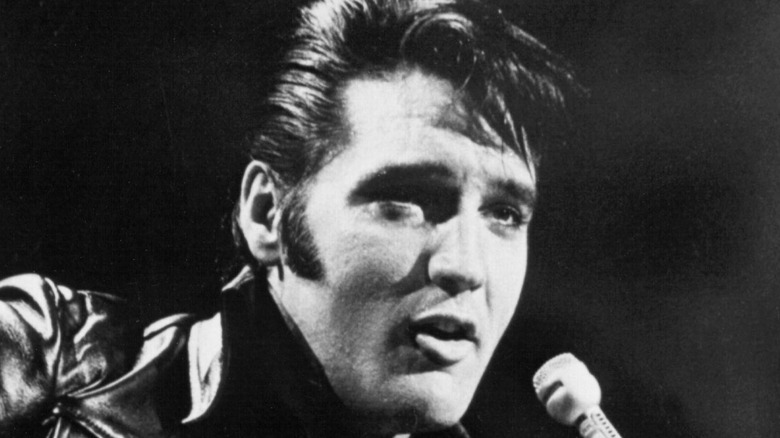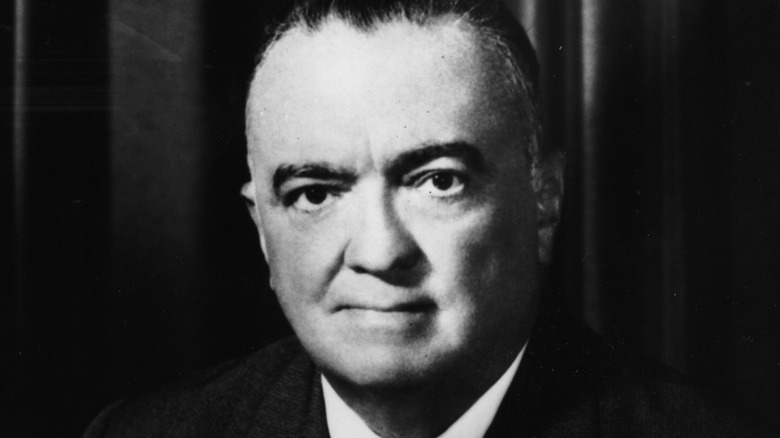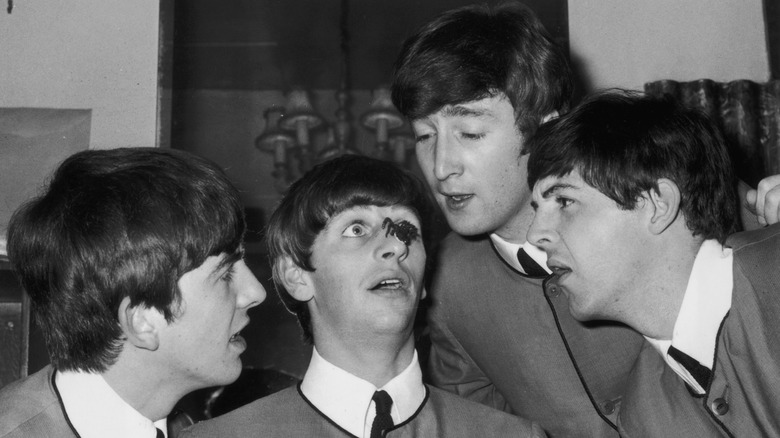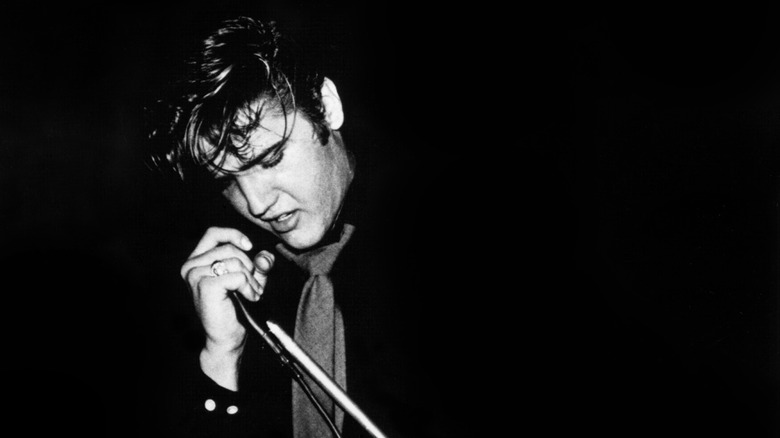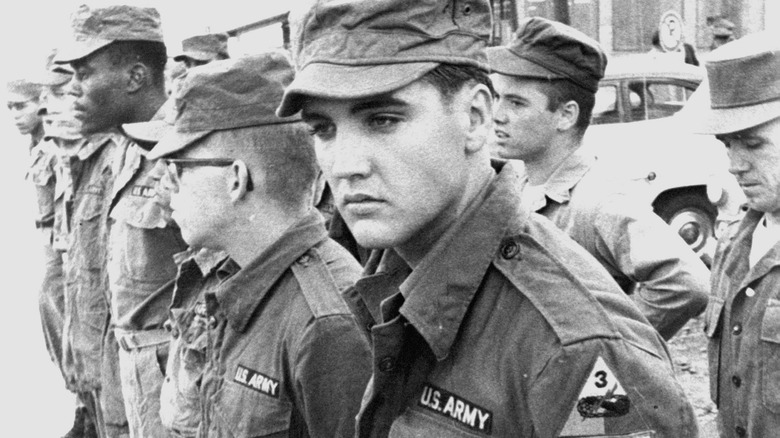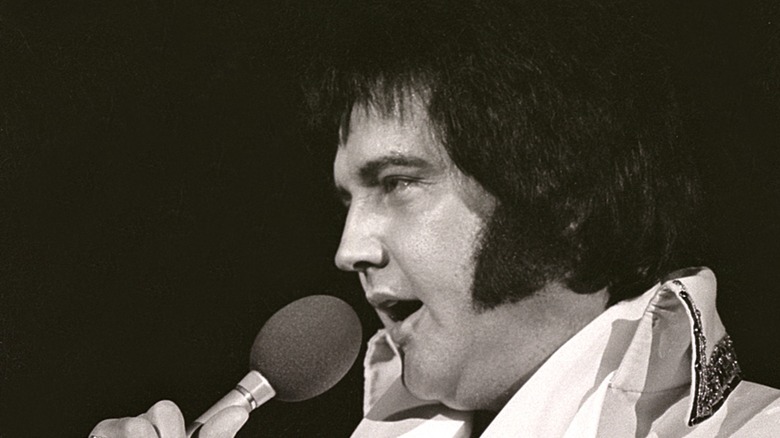Elvis Presley FBI Files Explained
J. Edgar Hoover became the first Director of the FBI in 1924, and remained in the post until his death in 1972 (via Britannica), and over the course of half a century effectively created the bureau in his image, establishing many of the methods through which the FBI still operates today. But as The Guardian notes, Hoover was also a controversial figure, who was happy to reflect the prejudices of his time — as well as his private paranoias — in the operations of his rapidly expanding organization. At the same time he publicly declared his apolitical stance, Hoover privately admitted his longtime support of the Republican party, and his revulsion towards Cold War communism, resulting in the FBI's assistance in McCarthyism and Harry S. Truman's belief that Hoover ran the FBI like the "Gestapo or secret police" (per the same source). As a result, almost every public figure of the day seemingly had their own FBI file, through which Hoover sought to identify political subversion. Surprisingly, this included even the most iconic stars of the day — including one Elvis Aaron Presley.
As PresLaw explains, Presley was never the subject of an orchestrated FBI investigation like many of his more seemingly subversive contemporaries. Presley made it very clear to U.S. authorities that he was on their side. Nevertheless, his name appears in hundreds of FBI files beginning in 1956 — the year Elvis became a megastar — and ending in 1980, three years after the singer's untimely death.
Hoover was warned about the threat of Elvis
Elvis Presley was a keen supporter of U.S. police forces and security bureaus, as reflected in the opening page of his FBI file, which begins with a 1972 letter to Richard Nixon from a badge collector. The collector describes himself, like Elvis, as a "police buff," and asks whether he can be sent a Federal Narcotics badge like the one Elvis had recently been given.
The second document, dated from 1971, is a letter to Elvis from FBI director J. Edgar Hoover. Hoover expresses his regret that he had been unable to meet the singer during his recent tour of the bureau's facilities. (The document that follows is a request on Elvis' behalf to be shown around the FBI buildings.) Undoubtedly, Hoover saw Elvis as an ally.
But as the Elvis files also show, two years earlier Hoover himself received a letter from a mother of five daughters, identifying the then-established music sensation as a danger to American life. "I believe he has done more harm in his style of dancing, to our young people than any one element in our society," the concerned citizen wrote (via PresLaw).
Elvis wanted the FBI to target celebrities
While Presley was identified as a moral threat by a certain segment of society, he had his own ideas about who was actually ruining America's youth and was happy to give the FBI the benefit of his supposed insight.
In 1978, the year after Elvis' death, the Washington Post published an article featuring a released FBI memo from Elvis' files, which described the singer's willingness to become an FBI informant around the time of his visit to the bureau's facilities in 1970. The memo claimed that Elvis had also advised agents that they should undertake an investigation into The Beatles, whose "filthy unkempt appearances and suggestive music" were a corrupting influence. Similarly, Elvis had claimed "that the Smothers brothers, Jane Fonda and other persons in the entertainment industry of their ilk have a lot to answer for in the hereafter for the way they have poisoned young minds by disparaging the United States in public statements and unsavory activities."
The memo also notes that Elvis was open in his admiration for J. Edgar Hoover. He claimed that he had read multiple books by the FBI director, including his critiques of communism, and that Elvis told agents Hoover was the "greatest living American" (per the Washington Post).
Elvis suffered harassment and death threats
Though Presley's FBI files contain numerous instances of the singer's direct contact with the bureau he patriotically admired, many others detail serious crimes plotted against the singer, including attempts at physical and mental harm, as well as schemes dreamed up by criminals looking to drain Elvis of his well-publicized wealth.
Per PresLaw, the second batch of FBI files contains reports of death threats: "At 6:15 A.M., 8/28/70 wife of a confidante of [Elvis] who is with him in Las Vegas, received anonymous call attempting to contact her husband and stated Elvis was going to get it tomorrow night; 45 minutes later same caller again called and stated a killer, who is a madman, was going to shoot Elvis, that he had a gun with a silencer." Other anonymous phone calls received at the time by Elvis and his entourage claimed that the singer was the target of a kidnapping plot, though nothing came of the threat. A memo from the third batch of FBI files details a postcard Elvis received in 1956 at the start of his career, which read: "IF YOU DON'T STOP THIS S*** NOW WE'RE GOING TO KILL YOU" (via PresLaw).
Blackmail and extortion
One of the most distressing incidents detailed in his FBI files again concerns Elvis as the victim of crime, this time while the singer was performing overseas service for the U.S. Army as a member of 1st Medium Tank Battalion, 32d Armor stationed in West Germany, per the U.S. Army Center of Military History. A memorandum to be found in the third batch of Elvis' FBI files reads: "Elvis Presley was interviewed on 28 December 1959 concerning his complaint that he was the victim of blackmail by a Mr. Laurens Johannes GRIESSEL-LANDAU, of Johannesburg, South Africa. GRIESSEL-LANDAU represents himself to be a doctor specialist in the field of dermatology. GRIESSEL-LANDAU is *not* a medical doctor" (via PresLaw).
The document then summarizes Elvis' altercation with Griessel-Landau, who fraudulently performed bogus dermatological treatments for the singer in exchange for cash, before embarrassing Elvis by making sexual advances to Elvis' Army colleagues. Elvis apparently confronted Griessel-Landau, who flew into a rage and in turn began to extort money from Elvis with the use of blackmail. Griessel-Landau threatened to expose Elvis as homosexual, and claimed to have photo evidence of him in "compromising situations," though Elvis in his complaint assured his superiors that there was no possibility such images existed.
Nevertheless, Elvis gave his blackmailer hundreds of dollars on the agreement that Griessel-Landau would leave the country for England January 1960. Griessel-Landau never contacted Elvis again.
The long history of Elvis' 'lost' plane
Many of the hundreds of documents in Elvis Presley's FBI files relate to issues concerning his Lockheed Jetstar, the last private plane the singer purchased in his lifetime. And like his unfortunate death, the ultimate fate of Elvis' "lost" plane proves that glamour and glory often sadly fade.
The theft of Elvis' executive jet dominates the second half of the singer's FBI files, with the bureau continuing an investigation into the disappearance of the jet following Elvis' death, and the possibility the plane had been transferred over state lines as stolen goods. As Condé Nast Traveler explains, the plane eventually wound up in an "airplane graveyard" in Roswell, New Mexico, where it baked under the hot sun for 35 years before finally being put up for auction. Sadly past its prime, the plane sold for $430,000, a fraction of the $3.5 million estimate, per Caters.
